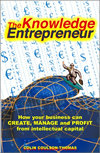 |
 |
|
 |
Corporate Transformation
By Professor Colin Coulson-Thomas
Some companies succeed. They adapt to changing circumstances, and
they remain relevant and vital. Their people manage change, compete and
win.
Other companies struggle and stagnate. They adopt fashionable approaches.
They buy the latest technologies. They introduce generic or re-engineered
processes, and they are advised by leading professional firms. Yet they
still fail.
Have you ever wondered why some companies are less successful than others
in similar circumstances? What are these people overlooking or doing wrong?
What do the winners do differently?
To answer these questions a research programme led by the author has examined
the corporate experience of over 2,000 companies for more than a decade.
Research teams have examined key processes such as those for winning business,
building relationships and creating and exploiting knowledge.
The outcomes achieved by survey participants are ranked from the most
to the least successful, and the approaches of the ‘winners’
or most successful are compared with the ‘losers’ or least
successful to isolate the factors that make a difference. The results
summarized in: ‘Transforming the Company, Manage Change, Compete
and Win’* suggest most of the critical success factors are attitudinal
and behavioural.
Encouragingly, there is enormous scope for improvement. Typically, even
the most successful companies are only very effective at less than a half
of the critical success factors. This suggests there is enormous scope
for improving the performance of key processes.
Let’s look at some overall differences between the behaviours of
those in key positions who fail and succeed respectively at bringing about
a fundamental transformation of their organizations.
First, we will examine the losers. They are indecisive and oblivious to
the needs of others. They are cautious, wary of commitments and fail to
inspire and motivate. They are also reactive. They respond to events and
often fail to anticipate the need to change.
Losers are indifferently led. Boards confuse operational and strategic
issues. They offer bland rhetoric and spin rather than a compelling vision
and clear direction. When they do act it is often in peripheral areas.
They overlook what is important and the biggest opportunities for performance
improvement.
Losers hoard information. They are reluctant to delegate and trust. Although
driven by their own agendas they often end up playing other people’s
games. They adopt standard approaches and are rigid and inflexible. They
imitate and copy others rather than think for themselves.
Losers are great talkers. They mouth generalizations and confuse activity
with progress. They are complacent, secretive and defensive. They try
to do everything themselves and they resist new and external ideas.
Losers train by sheep dipping. Individual needs are not addressed. Immediate
priorities take precedence over longer-term aims. A combination of attitudes,
approaches and priorities locks change losers into a negative spiral of
decline towards commodity product supplier status.
Winners in the challenge to change, transform and re-invent are very different.
They recognize that change can be stressful and can disrupt valued relationships.
They only alter what they need to change. Those affected are told why
change is necessary.
Winners have a longer-term perspective. They become trusted business partners
by enhancing their capabilities, deepening relationships, developing additional
options and remaining relevant.
Winners are confident, positive and pro-active. They articulate compelling
and distinctive visions. They build and release talent. They equip their
people to make whatever changes need to be brought about.
Winners explore, pioneer and discover. They encourage enterprise and innovation.
They trust other people, and share information and opportunities with
them where this is likely to prove mutually beneficial.
Winners address the specific realities and practicalities of what they
need to do to manage change. They inspire and motivate. They avoid wasted
effort and concentrate upon the areas of greatest opportunity. They understand
their customers and put themselves out to develop tailored responses to
their requirements and bespoke offerings.
While open to ideas, winners select people, business partners and opportunities
with care. They are persistent but pragmatic, and determined but adaptable
in pursuit of their aims. They take calculated risks, experiment with
new ways of working and learning, and create new knowledge, options and
choices.
Winners value relationships. They empathise and invite feedback. They
question and challenge, and listen and learn. They collaborate with complementary
spirits who share their vision and values. They enter into partnering
arrangements based upon openness and transparency.
The boards of change winners are competent and confident. They avoid the
distractions of trappings. Their game is to inspire, enable and support
growth, development and transformation. They cut through blather and hype
to get down to the fundamentals of what needs to be done.
Winners prefer simple solutions and direct action. They think before they
act, push back the boundaries of what is possible and become sought after
business partners. Effective change managers avoid diversions, panaceas
and single solutions. They focus on activities that deliver the results
they seek.
Change, renewal and transformation should be regarded as normal activities.
Work with colleagues to foster winning attitudes and behaviours, and ensure
a balance between change strategy and capability. All the pieces of the
jigsaw puzzle required for successful transformation and sustained competitiveness
should be in place.
Check that colleagues are clear about what they are trying to achieve
and are visibly committed to agreed objectives. Make sure that people
understand what they need to do and are enabled to act. Ensure barriers
to change are identified and tackled. Problems will arise. Their absence
could indicate a lack of ambition. Learning from them and celebrating
success help to sustain momentum.

Professor Colin Coulson-Thomas |
About the Author:
Professor Colin Coulson-Thomas
is an experienced chairman of award winning companies and consultant.
He has advised over 80 boards on how to improve board and corporate
performance, leads the world's largest winning business research
and best practice programme, and has reviewed the processes and
practices for winning business of over 50 companies.
Following marketing and general management roles Colin became the
world's first Professor of Corporate Transformation and more recently
Process Vision Holder of major transformation projects. He is the
author of over 30 books and reports, including ‘Individuals
and Enterprise’ (Blackhall Publishing, 1999), 'Shaping Things
to Come' (Blackhall Publishing, 2001), 'Transforming the Company,
Manage Change, Compete and Win' (Kogan Page, 2002 and 2004)
and ‘The Knowledge Entrepreneur’(Kogan Page,
2003). Colin has spoken at over 200 national and international conferences
and corporate events in over 20 countries. He can be contacted:
Tel: 01733 361 149
Fax: 01733 361 459
Email: colinct@tiscali.co.uk
Web: www.ntwkfirm.com/colin.coulson-thomas
|
|
Transforming the Company: Manage Change, Compete & Win
Colin Coulson-Thomas shows that to bridge the gap between rhetoric
and reality, business people must make far-reaching decisions about
the value to them and their companies of particular theories, past
assumptions and traditional approaches. Based on original research,
the first edition of this was ahead of its time and predicted many
of the current management trends. The author now brings the text bang
up-to-date for the 21st century. This second edition of Transforming
The Company shows how to turn theory into practice by highlighting
the obstacles and barriers that confront companies when trying to
bring about change. For management at all levels faced with this task,
this thought-provoking book will inspire and enlighten. |
| 
Buy
UK Buy
US
|
The Knowledge Entrepreneur: How Your Business Can Create,
Manage and Profit from Intellectual Capital
In many companies knowledge management has focused almost exclusively
upon the packaging of existing knowledge. This book is designed
to help readers boost revenues and profit by significantly improving
the performance of existing activities and also creating new offerings
that generate additional income. It shows how practical knowledge-based
job-support tools can transform work group productivity, and reveals
the enormous scope for addressing contemporary problems such as
"information overload" with imaginative responses. Additional
information includes: a list of possible commercial ventures; detailed
checklists that can be used for identifying and analysing opportunities
for knowledge entrepreneurship; and exercises for assessing entrepreneurial
potential and "scoping" possible products and services.
The free CD-ROM packaged with the book gives examples of particular
knowledge-based job support tools that have dramatically improved
desired results in crucial areas such as winning more business.
|

top of page |
 |
